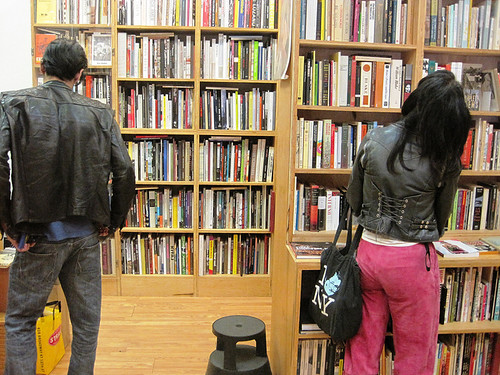On May 8, Mast Books, which takes up about 450 square feet at 66 Avenue A, sailed into its second year as a viable new business in the East Village. Why “Mast”? Is Bryan Leitgeb, who owns the store together with his wife, James McKee, a secret fan of Patrick O’Brian, C.S. Forester, and other icons of nautical literature? Smiling at this idea, Mr. Leitgeb shakes his head but says he prefers not to reveal why his store should have such a singular name.
Mr. Leitgeb, 37, who came to New York from Flint, Mich., is already a veteran of the city’s used-books business. (He spent seven years at Mercer Books alone.) He is also confident that he has hit upon the right business formula in the right place at the right time. Unlike East Village Books, long a fixture at 99 St. Marks Place, Mast has the air of a used book store acutely aware it is in the midst of an intellectual revolution that has raised the image far above the word.
This knowledge is Mast’s secret. With its polished wood floors, white walls, track lighting, and eye-catching display tables, it doesn’t look “used” or “second-hand” in the slightest. On the contrary, it is designed to evoke a small art gallery and to attract similarly chic crowds, although its strong neighborhood ethos prevents it from feeling in any way exclusionary. Mr. Leitgeb, whose blue eyes are alternately melancholy and highly focused, does his part to make non-hipsters feel at home by going unshaven, wearing non-designer glasses, and a brown cap unlikely to be featured in the next edition of Vogue. More importantly, he’s also unsnobbish, helpful, and friendly.
“For me, it’s about loving the books as objects as much as for their content,” he says, and that, surely, is the crux of the matter. With e-books proliferating, Mr. Leitgeb realizes books are increasingly prized as artifacts – for their design, vintage, rarity. “If I put out a really cool little mass market T.S. Eliot paperback with a great illustration on the cover, someone might buy it as an object,” he says, proving that the old adage, You can’t judge a book by its cover, is now heading toward the exits. “I do think the book is being turned into a semi-art object,” he adds.
Although some might wince at this evaluation, it suits him fine. “I’ve always been a collector more than a reader,” he says. “Candidly, I’m just really excited by discovering things, and now the book store has become my collection.” Ironically, we may be entering a period when used books are a more profitable business than new ones. “I would not want to open a new book store in 2011,” he says flatly.
The element that makes Mast “neighborly” in a genuine sense is its pricing, which is modest and affordable. Although Mr. Leitgeb has a cache of specialty items, some of which fetch as much as $3,000 (visiting Europeans, armed with Euros and enamored by the mythology of the East Village of yesteryear, are a particularly lucrative segment of his clientele), one can easily pick up a paperback for a handful of dollars. That could be a harrowing Richard Yates novel (“Disturbing the Peace”), a mass market Georges Simenon or Patricia Highsmith from the “Noir” nook, or a New Directions edition of Charles Baudelaire’s “Flowers of Evil” from the Poetry section.
The Baudelaire was purchased while I was in the store on a recent Saturday night by Eliza Douglas, a young East Village resident and native New Yorker. “It’s got a nice cover and I’ve never read Baudelaire before,” she told me. “And it’s only four dollars.” She seemed altogether delighted with her purchase. The selection was appropriate in another way. If the French poet, opium-dreamer and Decadent, were living in today’s New York, there’s a good chance he would be located within walking distance of Mast. On the other hand, he might recoil at the rents and decamp to Williamsburg, which is where Mr. Leitgeb, a former East Village resident, now lives.
 Brendan Bernhard Eliza Douglas, one minute after purchasing “The Flowers of Evil” by Charles Baudelaire.
Brendan Bernhard Eliza Douglas, one minute after purchasing “The Flowers of Evil” by Charles Baudelaire.Not that he ever intended to start his first private business in Brooklyn. “I knew I wanted to open a book store in Manhattan,” he says firmly. “The industry is here, the money is here.” His biggest regular buyers are “designers, architects, artists, and members of the fashion industry,” with art- and coffee table books being their primary interest. At the same time, “People who live locally and like what I do seemingly try to support the store.”
If there’s a quibble to be had with Mast, it’s that it may suit its downtown locale a little too snugly. Authors who do not stay on the shelf for long include the usual suspects – Brautigan, Bukowski, Vonnegut, Murakami — and except for the latter the same would have been true 40 years ago, when everyone was in flares and Woody Allen was making jokes about hippies.
Nor would Mast work if it were, say, on the Upper East Side, which makes it, in a narrow sense, a “regional” or “local” store. The result is that some readers may not find certain books because they don’t comply with the stereotypical “downtown” market.
Not that Mr. Leitgeb minds. His own sensibility is a downtown one, which gives his selection of books a nicely personal flavor. “This definitely reflects my taste,” he says, looking around the store. “Everything is filtered through me.”





